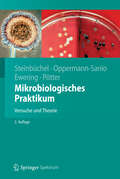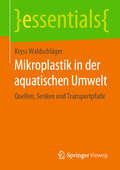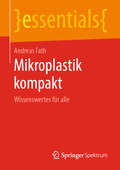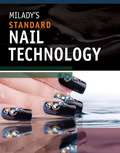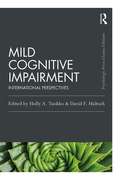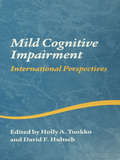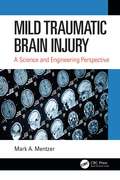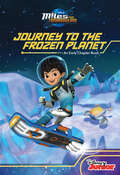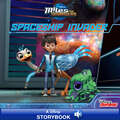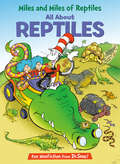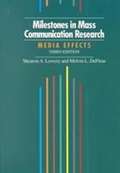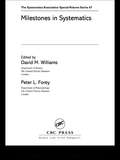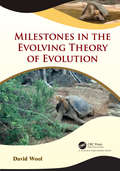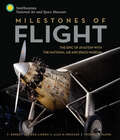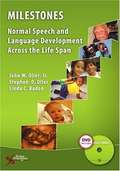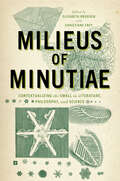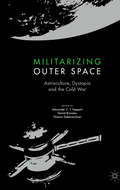- Table View
- List View
Mikrobiologie (Kompaktwissen Biologie)
by Olaf FritscheDie Reihe Kompaktwissen präsentiert in klarer, prägnanter Darstellung die Inhalte biologischer Fachgebiete. Ohne unnötigen Ballast und im richtigen Kontext erläutert jeder Band verständlich die Fakten, Zusammenhänge und Prinzipien eines Teilgebiets der Lebenswissenschaften. Damit eignet sich die Reihe besonders … zur Nachbereitung von Vorlesungen und Seminaren … zur Vorbereitung auf Prüfungen … zum Nachschlagen während des späteren Studiums oder im Berufsleben. Speziell für Studierende der Medizin wurde auch der Inhalt des Gegenstandskatalogs berücksichtigt und aufgenommen. Das Wichtigste zu Bakterien, Archaeen, Viren und eukaryotischen Mikroorganismen Das gesamte Wissen zur Mikrobiologie für die Prüfungen bis zum Bachelor oder ersten Staatsexamen in kompakter Form: Mikrobiologie als Wissenschaft Aufbau und Funktion der Zelle Wachstum und Vermehrung Stoffwechsel Genetik Evolution Systematik Ökologie Medizinische Mikrobiologie Mikrobielle Biotechnologie Arbeitsmethoden Für die 2. Auflage ergänzt um neue Erkenntnisse und aktuelle Themen wie COVID-19 und genetische Impfstoffe.
Mikrobiologisches Praktikum
by Alexander Steinbüchel Christian Ewering Fred Bernd Oppermann-Sanio Markus PötterMikroorganismen und ihre Wirkungen sowie biotechnologische Produkte werden in einfachen und anschaulichen Versuchen sichtbar gemacht. Ein Leitfaden zeigt, welche Experimente für welche Zielgruppe geeignet sind, die jeweiligen theoretischen Grundlagen werden ausführlich dargestellt. Außerdem liefert der Band Anregungen für Exkursionen. Kontrollfragen am Schluss jedes Kapitels dienen der Prüfungsvorbereitung und Nachbereitung. In der Neuauflage sind alle Abbildungen farbig, die Inhalte wurden komplett überarbeitet und erweitert.
Mikrobiologisches Praktikum: Versuche und Theorie
by Alexander Steinbüchel Christian Ewering Markus Pötter Fred Bernd Oppermann-SanioMikroorganismen und ihre Wirkungen sowie biotechnologische Produkte werden in einfachen und anschaulichen Versuchen sichtbar gemacht. Ein Leitfaden zeigt, welche Experimente für welche Zielgruppe geeignet sind, die jeweiligen theoretischen Grundlagen werden ausführlich dargestellt. Außerdem liefert der Band Anregungen für Exkursionen. Kontrollfragen am Schluss jedes Kapitels dienen der Prüfungsvorbereitung und Nachbereitung. In der Neuauflage sind alle Abbildungen farbig, die Inhalte wurden komplett überarbeitet und erweitert.
Mikrobiologisches Praktikum: Versuche und Theorie (Springer-Lehrbuch)
by Alexander Steinbüchel Christian Ewering Markus Pötter Fred Bernd Oppermann-SanioMikroorganismen und ihre Wirkungen sowie biotechnologische Produkte werden in einfachen und anschaulichen Versuchen sichtbar gemacht. Ein Leitfaden zeigt, welche Experimente für welche Zielgruppe geeignet sind, die jeweiligen theoretischen Grundlagen werden ausführlich dargestellt. Außerdem liefert der Band Anregungen für Exkursionen. Kontrollfragen am Schluss jedes Kapitels dienen der Prüfungsvorbereitung und Nachbereitung. In der Neuauflage sind alle Abbildungen farbig, die Inhalte wurden komplett überarbeitet und erweitert.
Mikroneuroanatomie und Chirurgie: Ein praktischer anatomischer Leitfaden
by Feres Chaddad-Neto Marcos Devanir Silva da CostaDie Mikroneuroanatomie ist für das Verständnis des Gehirns unerlässlich. Die Vermittlung von neuroanatomischen Kenntnissen ist in vielen Fällen eine schwierige Aufgabe, was jedoch vor allem an denjenigen liegt, die dieses Wissen in Kursen, Vorlesungen oder in Büchern vermitteln sollen.In Wirklichkeit ist die Neuroanatomie einfach und muss als Hilfsmittel für die Annäherung an die verschiedenen Bereiche des Gehirns und nicht als Hindernis verstanden werden. Die einzige Möglichkeit, dieses Problem zu überwinden, besteht darin, die Neuroanatomie mit verschiedenen Krankheitstypen in Beziehung zu setzen (arteriovenöse Fehlbildungen, Aneurysmen, Tumore, Kavernome, Hydrocephalus usw.).Dieses Buch bietet einen neuen Ansatz für die Beziehung zwischen Mikroneuroanatomie und Hirnerkrankungen. Jedes Kapitel befasst sich mit einer bestimmten neuroanatomischen Region und setzt alle wichtigen neuroanatomischen Aspekte mit den Krankheiten, die diese Region betreffen, in Beziehung. Außerdem bietet jedes Kapitel detaillierte Einblicke in die sichere Durchführung von hirnchirurgischen Eingriffen in der jeweiligen Region.
Mikroplastik in der aquatischen Umwelt: Quellen, Senken und Transportpfade (essentials)
by Kryss WaldschlägerMikroplastik ist derzeit ein allgegenwärtiges Thema in den Medien und wird daher auch in der Bevölkerung als umweltrelevante Problematik wahrgenommen. Da jedoch viel Halbwissen zur Meinungsbildung beiträgt, bereitet dieses essential den aktuellen Forschungstand auf und stellt ihn allgemein verständlich dar. Angefangen bei den Grundlagen der Mikroplastikdefinition und den derzeit bekannten Quellen über bisher nachgewiesene Konzentrationen in der aquatischen Umwelt bis hin zu den Senken wird der Weg des Mikroplastiks durch die Gewässer dieser Erde beschrieben. Abschließend wird auf die Umweltrisiken, die Mikroplastik für die Ökosysteme, die aquatischen Organismen und den Menschen birgt, eingegangen. Dabei werden viele Wissenslücken aufgezeigt, die zukünftig geschlossen werden müssen und die innerhalb der üblicherweise kurzen Beiträge in Massenmedien so nicht präsentiert werden.Die Autorin: Kryss Waldschläger hat Bauingenieurwesen studiert und arbeitet derzeit als wissenschaftliche Mitarbeiterin am Institut für Wasserbau und Wasserwirtschaft der RWTH Aachen University. Dort untersucht sie im Rahmen ihrer Promotion das Transportverhalten von Mikroplastik in Fließgewässern.
Mikroplastik kompakt: Wissenswertes für alle (essentials)
by Andreas FathWerden wir in den kommenden Jahren in unserem eigenen Plastikmüll ersticken? Oder schaffen wir es, noch rechtzeitig die Kurve zu kriegen? Die stetig wachsende Plastikmüllmenge ist problematisch für die Umwelt und den Mensch, der den Plastikmüll in Form von Mikroplastik aufnimmt. Der Autor Andreas Fath erklärt wissenschaftlich fundiert, aber allgemein verständlich, was Mikroplastik ist, wo es herkommt und welche Gefahren damit verbunden sind.
Milady's Standard: Nail Technology
by MiladyThis latest edition of Milady's Standard Nail Technology contains new and updated information on many subjects including infection control, product chemistry, manicuring, pedicuring, electric filing, monomer liquid and polymer powder nail enhancements and UV gels. Also included is a completely new chapter, The Creative Touch, loaded with the latest nail art mediums and techniques to enhance the learner's experience. In order to make for easier implementation, select editorial content from Milady's Standard Nail Technology and Milady's Standard Cosmetology have been aligned. This new format makes this the most complete resource for students to kick off their nail technology careers. Also included are brand new photographs and art that depict nail technicians performing their work and serving their clients encompassed by more than 400 pieces of art throughout the book, including procedural art.
Mild Cognitive Impairment: International Perspectives (Psychology Press & Routledge Classic Editions)
by Holly A. Tuokko David F. HultschThe Classic Edition of this foundational text includes a new preface from Holly A. Tuokko, examining how the field of Mild Cognitive Impairment (MCI) has developed since first publication. Bringing together research from multiple studies and perspectives from various countries, the volume identifies MCI as an important clinical transition between normal aging and the early stages of Alzheimer's disease (AD). The up-to-date preface highlights the expansion in research, examining the benefits of various pharmacological, cognitive and behavioral approaches to intervention. Influenced by recent findings in neuroplasticity across the lifespan, the book recognizes the importance of intervention at the earliest stages of the decline trajectory. It revisits the contested diagnostic approaches for MCI as well as the varying prevalence of MCI internationally, yet points to the need for further longitudinal studies to fully understand the condition. Mild Cognitive Impairment continues to provide a comprehensive resource for clinicians, researchers and students involved in the study, diagnosis, treatment and rehabilitation of people with MCI.
Mild Cognitive Impairment: International Perspectives (Studies on Neuropsychology, Neurology and Cognition)
by Holly A. Tuokko David F. HultschMild Cognitive Impairment (MCI) has been identified as an important clinical transition between normal aging and the early stages of Alzheimer's disease (AD). Since treatments for AD are most likely to be most effective early in the course of the disease, MCI has become a topic of great importance and has been investigated in different populations of interest in many countries. This book brings together these differing perspectives on MCI for the first time. This volume provides a comprehensive resource for clinicians, researchers, and students involved in the study, diagnosis, treatment, and rehabilitation of people with MCI. Clinical investigators initially defined mild cognitive impairment (MCI) as a transitional condition between normal aging and the early stages of Alzheimer’s disease (AD). Because the prevalence of AD increases with age and very large numbers of older adults are affected worldwide, these clinicians saw a pressing need to identify AD as early as possible. It is at this very early stage in the disease course that treatments to slow the progress and control symptoms are likely to be most effective. Since the first introduction of MCI, research interest has grown exponentially, and the utility of the concept has been investigated from a variety of perspectives in different populations of interest (e.g., clinical samples, volunteers, population-based screening) in many different countries. Much variability in findings has resulted. Although it has been acknowledged that the differences observed between samples may be ‘legitimate variations’, there has been no attempt to understand what it is we have learned about MCI (i.e., common features and differences) from each of these perspectives. This book brings together information about MCI in different populations from around the world. Mild Cognitive Impairment will be an important resource for any clinician, researcher, or student involved in the study, detection, treatment, and rehabilitation of people with MCI.
Mild Traumatic Brain Injury: A Science and Engineering Perspective
by Mark A. MentzerMild traumatic brain injury (mTBI), directly related to chronic traumatic encephalopathy, presents a crisis in contact sports, the military, and public health. Mild Traumatic Brain Injury: A Science and Engineering Perspective reviews current understanding of mTBI, methods of diagnosis, treatment, policy concerns, and emerging technologies. It details the neurophysiology and epidemiology of brain injuries by presenting disease models and descriptions of nucleating events, characterizes sensors, imagers, and related diagnostic measures used for evaluating and identifying brain injuries, and relates emerging bioinformatics analysis with mTBI markers. The book goes on to discuss issues with sports medicine and military issues; covers therapeutic strategies, surgeries, and future developments; and finally addresses drug trials and candidates for therapy. The broad coverage and accessible discussions will appeal to professionals in diverse fields related to mTBI, students of neurology, medicine, and biology, as well as policy makers and lay persons interested in this hot topic. Features Summarizes the entire scope of the field of mTBI Details the neurophysiology, epidemiology, and presents disease models and descriptions of nucleating events Characterizes sensors, imagers, and related diagnostic measures and relates emerging bioinformatics analysis with mTBI markers Discusses issues with sports medicine and military issues Covers therapeutic strategies, surgeries, and future developments and addresses drug trials and candidates Dr Mark Mentzer earned his PhD in Electrical Engineering from the University of Delaware. He is a former research scientist at the US Army Research Laboratory where he studied mild traumatic brain injury and developed early-detection brain injury helmet sensors. He is a certified test director and contracting officer representative. He possesses two Level-III Defense Acquisition University Certifications in Science and Technology Management and in Test and Evaluation. During his career, he developed a wide range of sensors and instrumentation as well as biochemical processes to assess brain trauma. Mentzer currently teaches graduate systems engineering and computer science courses at the University of Maryland University College.
Miles From Tomorrowland: Journey to the Frozen Planet
by Disney Book GroupMiles goes on a mission to retrieve a frozen rover on an ice-covered exoplanet. Suddenly, his sister, Loretta, slips and gets swept away down the river. It's up to Miles to save her in this far-out, fast-paced early chapter book filled with super-stellar illustrations!
Miles From Tomorrowland: Spaceship Invader
by Disney Book GroupRead along with Disney! While on a mission, Miles discovers what seems to be a cool fuzzy rock. But when chaos breaks out on the Stellosphere, Miles realizes that his discovery may not be a rock after all! Help Miles solve the mystery in this blastastic storybook with word for word narration!
Miles and Miles of Reptiles: All About Reptiles (The Cat in the Hat's Learning Library)
by Tish RabeLaugh and learn with fun facts about lizards, snakes, crocodiles, and more—all told in Dr. Seuss&’s beloved rhyming style and starring the Cat in the Hat! &“I&’m the Cat in the Hat in my Crocodile Car. We&’re off to find reptiles wherever they are.&” The Cat in the Hat&’s Learning Library series combines beloved characters, engaging rhymes, and Seussian illustrations to introduce children to non-fiction topics from the real world! Explore the world of reptiles and learn: • how snakes smell with their tongue• the difference between a turtle and a tortoise• why a chameleon changes colors• and much more! Perfect for story time and for the youngest readers, Miles and Miles of Reptiles: All About Reptiles also includes an index, glossary, and suggestions for further learning. Look for more books in the Cat in the Hat&’s Learning Library series!If I Ran the Horse Show: All About HorsesClam-I-Am! All About the BeachA Whale of a Tale! All About Porpoises, Dolphins, and WhalesSafari, So Good! All About African WildlifeThere's a Map on My Lap! All About MapsOh, the Lavas That Flow! All About VolcanoesOut of Sight Till Tonight! All About Nocturnal AnimalsWhat Cat Is That? All About CatsOnce upon a Mastodon: All About Prehistoric MammalsOh Say Can You Say What's the Weather Today? All About WeatherThe Cat on the Mat: All About Mindfulness
Milestones in Mass Communication Research: Media Effects (Third Edition)
by Melvin L. Defleur Shearon A. LoweryMilestones in Mass Communication Research,3/e offers an impressive history of mass communication research over the past 60 years and emphasizes media effects.
Milestones in Microwave Chemistry
by György KeglevichThis book looks back on thirty-five years of microwave (MW)chemistry and explains how the application of the MW technique became anintegral part of R&D, eventually becoming recognized in industry. Further,it details how MW chemistry has undergone a dynamic development in the pastthree decades, one driven by the advent of increasingly sophisticatedprofessional MW reactors in place of the kitchen MW ovens used in earlieryears. A major part of the book shows how substitutions, esterifications,amidations, hydrolyses, alkylations, eliminations, dehydrations, condensations,cyclizations, C-C couplings and the modification of heterocycles can beperformed advantageously under MW irradiation, as the reaction times areshorter, while the selectivity and yields are higher; it also explains why inmost cases, the reactions can be performed under solvent-free conditions. MWirradiation within the sphere of organophosphorus chemistry is showcased andtypical reactions, such as the direct derivatization of phosphinic acids,alkylating esterifications, Diels-Alder reactions, the inverse Wittig-typereaction, fragmentations, the Arbuzov reaction, the synthesis ofα-hydroxyphosphonates and α-aminophosphonates (the Kabachnik-Fieldscondensation), deoxygenations and P-C coupling reactions are described under MWconditions. In closing, the advantages of MW chemistry such as faster reactionsand the possibility of simplifying the catalytic systems are addressed.
Milestones in Systematics
by David M. Williams Peter L. ForeyPresenting a historical analysis of the evolution of systematics during the last one hundred years, Milestones in Systematics reviews many of the major issues in systematic theory and practice that have driven the working methods of systematics during the 20th century and looks at the issues most likely to preoccupy systematists in the immediate fu
Milestones in the Evolving Theory of Evolution
by David WoolThe book illustrates how Darwin's theory has evolved, about the development of the biological world before Darwin, and great changes that took place with the incorporation of statistics, and after Darwin's death of genetics and mathematics. The formation of ‘Modern Synthesis’, protein electrophoresis, Discovery of DNA opened new avenues for the study of evolution.
Milestones of Flight: The Epic of Aviation with the National Air and Space Museum
by F. Robert van der Linden Alex M. Spencer Thomas J. PaoneExperience the history of flight with the world-class aviation collection at the Smithsonian's National Air and Space Museum, which attracts millions and millions of visitors each year in Washington, D.C.From the moment the Wright Brothers first took flight in 1903 to the modern-day reliance on stealth aircraft and drones, there have been significant advances made in aviation. Milestones of Flight celebrates each era of advancements by showcasing the Smithsonian National Air and Space Museum's world-class aircraft collection. Authored by Dr. Robert van der Linden, a leading expert on aviation and Chairman of the Aeronautics Department at the NASM, this book is a stunning profile of the advancements in flight from decade to decade, illustrated with beautiful, large-scale photography and enhanced with little-known facts, anecdotes, and insights from major players in the aviation industry.Climb inside the cockpit of the Spirit of St. Louis that Charles Lindbergh piloted solo across the Atlantic Ocean, making history. Contrast that with a Boeing B-29 Superfortress, the first aircraft to drop an atomic bomb. The full-page photos of each milestone-making aircraft are accompanied by timelines to showcase related aircraft as well as sidebars with interesting and little-known facts, stories, and related research.Milestone categories include:- Era of Early Flight- World War I First Fighters- Long-Range Record-Setting Flight- Popular Flight- First Commercial Airliners- World War II Aircraft- Experimental Flight- Cold War Military/Korean Conflict Aircraft- Commercial Jets- Modern Military AircraftWhat will the next milestone be?
Milestones: Normal Speech and Language Development Across the Life Span
by John W. Oller Stephen D. Oller Linda C. BadonThis book provides an introduction to cutting-edge theory and research dealing not only with the development of speech forms but with the full range of sign systems that undergird normal speech and language development across the whole life span.
Milieus of Minutiae: Contextualizing the Small in Literature, Philosophy, and Science
by Cynthia Wall Hans-Jörg Rheinberger Christopher Johnson Roger Maioli Margareta Ingrid Christian Andreas Mahler Marianne Schuller Mareike Schildmann Elena Fabietti Carmen Schmechel Dan Liu Malte RauchThe long history of tiny matter(s) in the sciences, thought, and culture From catastrophic weather and steady warming caused by the accumulation of carbon particles in the Earth&’s atmosphere to societies brought to a standstill by microscopic viruses, the new millennium has reminded us of how the minutest of phenomena can have outsized effects. This notion is one that has preoccupied the European and Anglo-American cultural imaginary since at least early modernity.Milieus of Minutiae brings together an interdisciplinary group of scholars to investigate various forms and appearances of minutiae prior to and beyond the advent of magnification. The collection illuminates connections between the empirical practices and technologies with which minutiae have come to be associated and the broader, more diffuse discourses—from the philosophical to the artistic—that have attended theories of smallness before and after Hooke&’s Micrographia. Placing essays on Renaissance poetry, Romantic fiction, and matters of punctuation alongside essays on early modern germ theory and the optics of microscopic technology, this rigorously framed volume extends from sixteenth-century pathology to twentieth-century architectural theory, natural science to literature and art.
Militarizing Outer Space: Astroculture, Dystopia and the Cold War (Palgrave Studies in the History of Science and Technology)
by Alexander C. T. Geppert Daniel Brandau Tilmann SiebeneichnerMilitarizing Outer Space explores the dystopian and destructive dimensions of the Space Age and challenges conventional narratives of a bipolar Cold War rivalry. Concentrating on weapons, warfare and violence, this provocative volume examines real and imagined endeavors of arming the skies and conquering the heavens. The third and final volume in the groundbreaking European Astroculture trilogy, Militarizing Outer Space zooms in on the interplay between security, technopolitics and knowledge from the 1920s through the 1980s. Often hailed as the site of heavenly utopias and otherworldly salvation, outer space transformed from a promised sanctuary to a present threat, where the battles of the future were to be waged. Astroculture proved instrumental in fathoming forms and functions of warfare’s futures past, both on earth and in space. The allure of dominating outer space, the book shows, was neither limited to the early twenty-first century nor to current American space force rhetorics.
Militarizing the Environment: Climate Change and the Security State
by Robert P. MarzecAs the seriousness of climate change becomes more and more obvious, military institutions are responding by taking a prominent role in the governing of environmental concerns, engaging in &“climate change war games,&” and preparing for the effects of climate change—from conflicts due to loss of food, water, and energy to the mass migration of millions of people displaced by rising sea levels. This combat-oriented stance stems from a self-destructive pattern of thought that Robert P. Marzec names &“environmentality,&” an attitude that has been affecting human–environmental relations since the seventeenth century.Militarizing the Environment traces the rise of this influential mindset in America and other nations that threatens to supplant ideas of sustainability with demands for adaptation. In this extensive historical study of scientific, military, political, and economic formations across five centuries, Marzec reveals how environmentality has been instrumental in the development of today&’s security society—informing the creation of the military-industrial complex during World War II and the National Security Act that established the CIA during the Cold War.Now embedded in contemporary Western thought, environmentality has even infiltrated scientific thinking—transforming Darwinian insights into a quasi-theology that makes security the biological basis of existence. Marzec exposes the self-destructive nature of this increasingly accepted worldview and offers alternatives that counter the blind alleys of national and global security.
Military Adaptation in War
by Williamson MurrayMilitary Adaptation in War addresses one of the most persistent, yet rarely examined, problems that military organizations confront: namely, the problem of how to adapt under the trying, terrifying conditions of war. This work builds on the volume that Professor Williamson Murray edited with Allan Millett on military innovation (a quite different problem, though similar in some respects). In Clausewitzian terms, war is a contest, an interactive duel, which is of indeterminate length and presents a series of intractable problems at every level, from policy and strategy down to the tactical. Moreover, the fact that the enemy is adapting at the same time presents military organizations with an ever-changing set of conundrums that offer up no easy solutions. As the British general, James Wolfe, suggested before Quebec: "War is an option of difficulties. " Dr. Murray provides an in-depth analysis of the problems that military forces confront in adapting to these difficulties.
Military Avionics Systems (Aerospace Series #6)
by Ian Moir Allan SeabridgeThis book introduces the military roles expected of aircraft types and describes the avionics systems required to fulfill these roles. These range from technology and architectures through to navigations systems, sensors, computing architectures, and the human-machine interface. It enables students to put together combinations of systems in order to perform specific military roles. <P><P>A complementary volume to the authors’ previous title Civil Avionics Systems, this book covers a wide range of military aircraft roles and systems applications. It offers clear and concise system descriptions; includes case studies and examples from real life, current projects; and features numerous illustrations and photographs. <P><P> It is a valuable resource for students of aerospace engineering as well as practitioners in the field of aerospace who wish to extend their knowledge.

